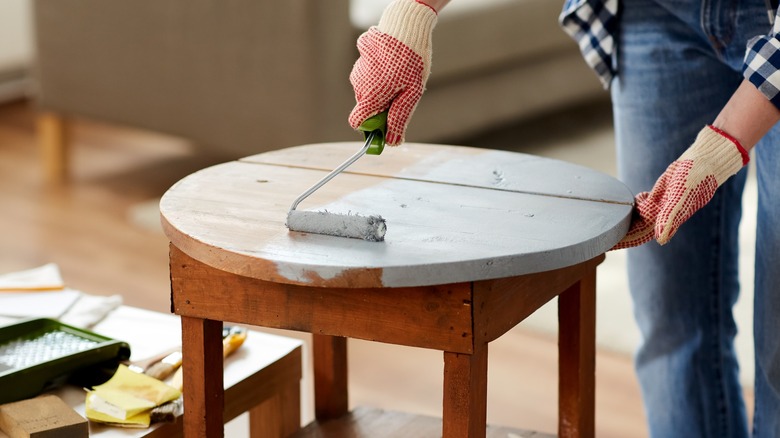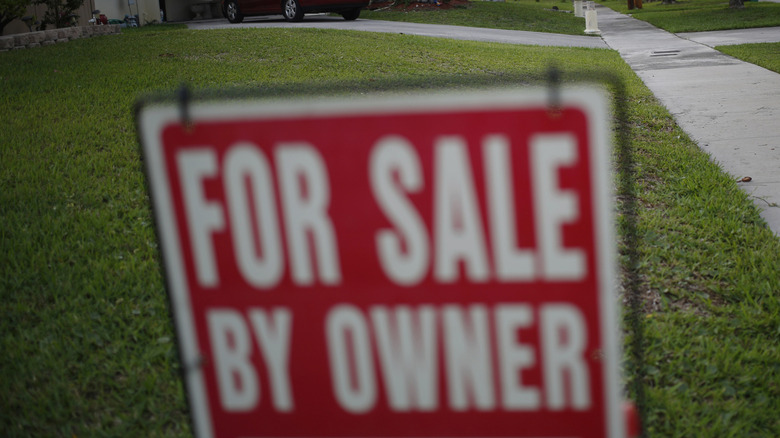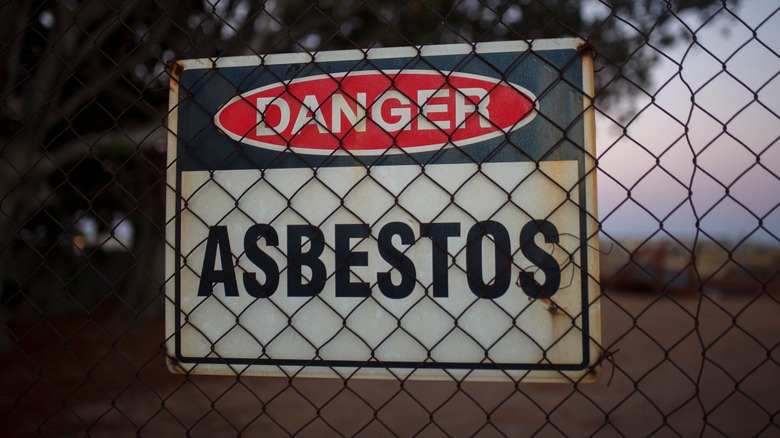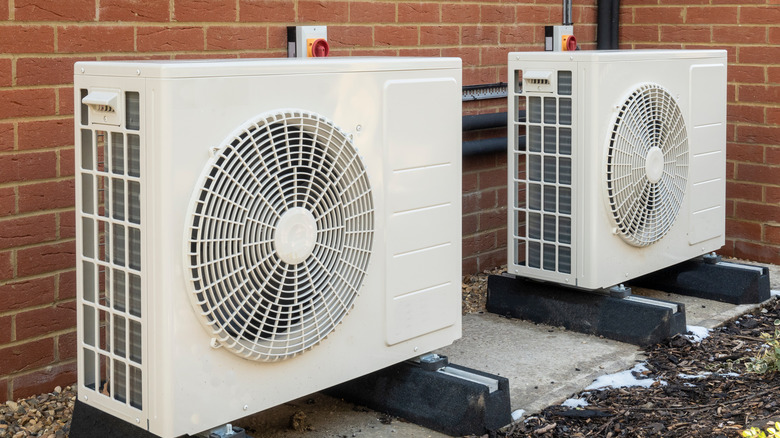14 Important Questions To Ask At An Open House
According to RWM Home Loans, an open house is a casual event where a listing agent shows off a property to the public and other real estate agents. They do this to generate interest in a property they are currently representing. An open house typically lasts at least an hour but can go up to three. During this time, anyone is welcome to stop by the house and look around. Even if you have no intention of buying a home, you can still attend and explore.
However, if you are in the market to buy a home, an open house is an ideal time to speak with the listing real estate agent and even the seller if they are present. You can find out a few things about the property and surrounding area. To really make the most out of your time, there are a few key questions that you need to ask while there.
1. Has the seller done any DIY renovations?
Sometimes DIY renovation projects don't increase the home value as the seller might hope. If the seller has a low renovation skill level, the quality might mean the new buyer would need to come in behind them and repair things again. "Unfortunately, I think many people overestimate their home improvement abilities," Jim Molinelli, a Maryland-based architect, told Money. "What's driving that false sense of confidence is home remodeling TV shows. We watch first timers tackle incredible projects on TV and, despite encountering problems, everything always turns out perfectly. But that's not how things work in the real world."
If the seller recently hired a professional contractor to redo the kitchen, that is one thing. However, if someone with no building experience took it upon themselves to retile the bathroom, that's something else entirely. You can typically spot a bad DIY renovation with the naked eye. However, if the homeowner cut some corners, it's good to ask about it so you can double-check things during the inspection phase.
2. Has the listing agent done a market analysis?
Doing a market analysis means the listing agent has looked into other local recent sales. They have also examined the property taxes and values in the area to give the home they are selling a fair price. Ask about the market analysis at an open house because you deserve to know whether or not the seller has done their due diligence. According to RealWealth, this process is sometimes called a comparative market analysis (CMA) by those in the industry. Sometimes, the buyer can perform a CMA in addition to this one completed by the listing agent. In a market where buyers are favored, this can be especially beneficial.
To start, think about the overall quality of the home. What is the square footage? How old is the property? How many bathrooms does it have? What is its proximity to amenities and local landmarks? Consider the local area and the price of similar homes. Does the cost of the home seem fair based on this information?
3. What are the neighbors like?
If the seller or agent knows anything about the general feel of the people you will be living near, it's good to know about them. Do people tend to keep to themselves in this area? Are there block parties and community events? Are the neighbors friendly? Or maybe they are, but they have a mean dog who always seems to get out. According to Place, having a solid relationship with those in your community is one of the secrets to having a happy home life.
One of the best reasons for searching for friendly neighbors is having someone to keep an eye on your property. Even if you are not out of town, a watchful neighbor might notice someone unfamiliar lurking outside when you are at work. Or, they could lend you a cup of sugar in a pinch, get your mail, or even take care of your pets or plants. In addition, having a good relationship with your neighbors means solving local issues like barking dogs, easements, and maintenance issues quickly and without drama.
4. Why is the seller moving?
Is something wrong with the home and area, or is it for personal reasons? To avoid seeming too nosy, you don't need to push too hard with this one, but try to get a general idea. According to Life Storage Blog, people move for a variety of reasons. The most common is being closer to family, followed closely by moving for work or a romantic partner. These are all great reasons to relocate that have nothing to do with the quality of the property. For example, the current owner might not have a car. The home is too far from the train station and adds too long to their daily commute, so they move. This problem will not be an issue if you have a car.
However, if you find out they are moving because the house across the street actually belongs to a party fraternity, toxic mold in the walls is making them sick, or the local HOA rules with an iron fist, you might also want to get out while you still can.
5. When was the roof last replaced?
The last thing you want to do when you move in is pay for a new roof, so it's a good idea to ask about the roof replacement at an open house. According to Golden Group Roofing, a good roof is a primary selling point for most buyers. If you feel concerned about the quality of the roof on the house you want to buy, you are not alone. "Roof condition is a key focus area of every good home inspector, not just to determine remaining life expectancy, but also to identify any areas of leaking, poor ventilation, and resulting mold which is a serious health consideration," said Charlene Frary, a real estate agent.
She isn't the only one who thinks this way. "In my history as a realtor, I have had more than a couple of buyers either back out of a deal due to the roof's condition – or ask the seller to do repairs/give monetary compensation," said Mary O'Hagan, a real estate specialist. You won't scare the seller by asking. Other buyers are probably asking the exact same questions.
6. Has the home ever flooded?
If a home has flooded once, it might be at risk of flooding again. Even if you don't live in a flood zone, it's worth asking to see what the prospect is. For example, according to the Houston Properties Team, Hurricane Harvey flooded the city of Houston in August 2017, and many real estate agents note whether or not a home took on water during the storm still to this day. If a home has a history of flooding, certain insurance companies might refuse to protect it from further water damage.
If this is the case, buying the home in question could be a big gamble, as your belongings would be in danger. Even if a house has never flooded, if it rests in a flood zone, you might still run into trouble getting it insured, depending on its FEMA classification (via Rocket Mortgage). The same is true for a home vulnerable to other natural disasters, like earthquakes, mudslides, and wildfires.
7. How long has the home been for sale?
If a home has been on the market for a while, it's usually a sign that something is wrong. This fact is especially true in a competitive housing market. According to HomeGo, the best way to gauge whether or not a home has been for sale too long is how quickly other homes are selling. If nearby comparable houses have been on the market for about the same time as the home you are interested in, then it could be a slower market, and buyers can take their time. However, dig a little deeper if other homes have come and gone since the listing. Something is scaring other buyers away.
It could be a price that is not worth the quality in the area. It could also be awful neighbors, extremely high HOA fees, or even damage like mold. If the home is stagnant on the market, it's always okay to ask the listing agent for an explanation. Their answer can give you the context you need to make the best choice.
8. Are there structural or safety issues we might find during inspections?
There are plenty of issues to address at the open house, including cracks in the foundation or mold and asbestos. If the seller knows about these things, they must legally disclose them to potential buyers. Each of these issues typically requires lengthy and expensive repairs and could weigh heavily on a buyer's choice to go through with the deal. According to Nolo, the required disclosures can vary based on the state. In addition, most disclosures require sellers to let buyers know about things they are aware of.
However, this can still play out in a buyer's favor. For example, one buyer could inspect the house and discover asbestos. They do not want to pay to remove it, and since they had an inspection contingency, they pull out of the deal with no penalty. The seller is now aware of the problem and must legally disclose it to all new buyers. Typically at a reduced price, as well. Always ask about these up front so you don't waste time on a house that might turn out to be a money pit.
9. When were the home's systems last updated?
This question can help you determine whether you might be on the hook for a new air conditioner in the next few years. It's the same situation for a home's electricity or plumbing system. According to ARAG, handling undisclosed repairs is one of the most annoying parts of buying a home. Some laws require sellers to disclose things that might affect your health after you move in. However, there are fewer laws around annoying things that might affect your pocketbook.
Talk to the listing agent or the seller at the open house to learn more about the condition of the home's systems. Is the home's furnace in good shape? Is the wiring in the home old and fraying, or nice and new? What's the condition of the home's insulation? Most agents will know these answers off-hand. If not, they can easily find out for you.
10. Is there a HOA? What does it cover?
You should know what you are getting into before buying a home. HOA stands for homeowners association. According to Triangle Trusted Realtors, HOA fees and the level of involvement can vary greatly by neighborhood. They typically ensure the value of the area continues to rise and everyone follows a set of rules to keep things in good shape. They also look after the amenities of the neighborhood.
However, occasionally, HOA management can operate on a bit of a power trip, making everyday life difficult for residents who wish for more freedom over their properties. You need to find out the annual HOA fee per property and how it's charged (monthly, annually). You can also investigate whether or not the fees charged by the HOA for the home you are interested in are on par for the area or if they seem to be overcharging. Remember, you will have to pay this amount each month for the entire time you live in the home after you finish paying off your mortgage. Consider if it is reasonable or not.
11. What are the amenities in the neighborhood like?
According to Habitat for Humanity, if you want a good idea of what life is like in the neighborhood, you will need to do some research before moving in. Consider learning more about the local public schools if you have children. Does the homeowner like the schools, or do they send their children elsewhere? Does the real estate agent have an opinion on the local education standards?
In addition to those options, you might want to know about the amenities available to residents, like swimming pools, biking trails, green space, and even supermarkets. Would you travel a great distance to reach your favorite grocery store, or is it right around the corner? What about dry cleaners, post offices, hospitals, parks, and pharmacies? Knowing these sorts of things well before purchasing a home can make for a smoother transition on the other side.
12. Are there contingencies the seller will or won't accept?
In a seller's market, things can move quickly. Before you put together an offer for a home, you need to know the deal breakers for the seller. According to Homeward, you can include a contingency when you make an offer on a home. A contingency means you will honor your offer if the seller addresses problems with the house. There are four main types of contingencies.
The first is an inspection contingency, which involves purchasing the house pending a home inspection to find problems. The second is an appraisal contingency. This process involves your lender double-checking the property value before you buy. Next comes a financing contingency. If you are sure you can get the correct financing, you can cancel the deal without penalty if you can't secure a mortgage in time. Finally, there is a home sale contingency. This contingency means that you can only purchase the new home after you sell your current home. So, at an open house, it's a good idea to get a feeling of whether or not a buyer might reject an offer with any of these contingencies before you put one together.
13. How much does the seller typically pay in utilities?
Utilities include gas, electricity, water, and propane heating. According to Homes, it's essential to have a general idea of how much the person typically pays per month. When asking, consider the different times of the year and how costs might vary. For example, do you live somewhere with mild summers and freezing winters, or vice versa? If this is the case, the costs associated with keeping the home at a more comfortable temperature will be lopsided during the year.
In addition, if the HVAC system in the home is old, it might be working overtime to keep things going, meaning your expenses could be significantly higher than in your current house. High heating and cooling bills can also tip you off to problems in the home's insulation. The length of time a homeowner has had a specific bill is also something to query. If the home's history of gas payments is not long, it means the house used oil to heat itself until recently.
14. Are there or have there ever been pests?
Is there a raccoon in the attic that might come with the house? What about bees that tend to swarm in springtime? Knowing about uninvited visitors before you purchase a home is essential because you can get a better idea of what to expect. For example, according to Alexandria Animals, raccoons are clever little animals that can be tricky to get rid of if they enjoy sharing your property with you. The best way to get a raccoon out of your attic is to never let them in there in the first place. If you are buying a house with one, it will be an ordeal.
In addition, it's good to know if the home has ever had problems with pests in the past. For example, termites cause over one billion dollars of damage to homes in the USA annually (via Home Depot). If your prospective home had an infestation in the past, it's good to know so you can keep an eye out for the second wave of invasion and get ahead of things in the future.














